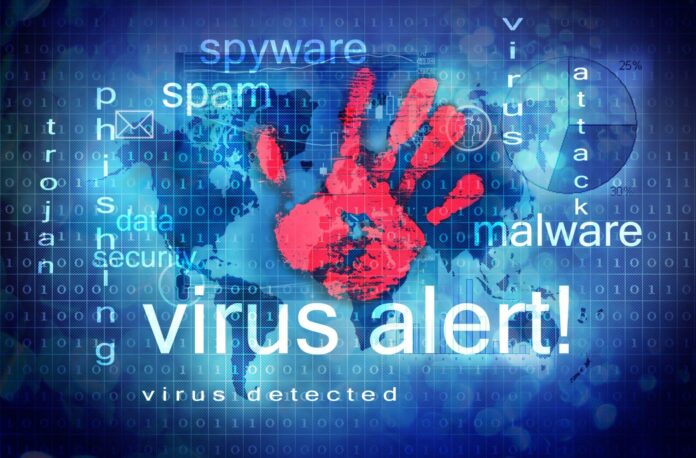
You probably heard of computer Worms, Viruses, and Trojans, but you really can’t tell the difference. While it may seem irrelevant, knowing this information could help you to choose an effective security solution for your devices. Similarly, you can read online reviews of available antiviruses to come up with a better choice. For instance, you can visit this site bestantiviruspro.org to know if Ccleaner is the best antivirus for you.
However, if you lack information on these threats, this text will provide the necessary background regarding viruses, worms, and trojans.
What is a Computer Virus?
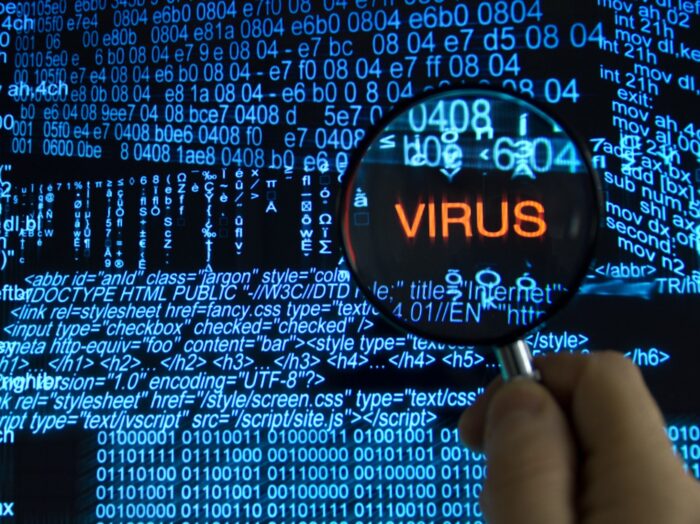
Basically, this is malicious software (malware) that’s introduced onto someone’s computer to perform malicious actions without their knowledge. This malware program can self-replicate and load onto other files and programs, thus infecting them. The classification of Viruses will depend on the mechanism they use to infect devices. Some of the known classes are:
- Script viruses;
- File viruses;
- Macro viruses;
- Boot sector viruses.
What is a Computer Worm?

This is a stand-alone malware program that can also replicate and spread to other devices. Usually, it exploits network security failures to have access to your applications or operating system. After having access, it will utilize the device as a host to infect other linked computers. With regard to spreading, worms will use a variety of methods that include:
- Email – where it’s sent inside files in email attachments;
- Internet – where it’s spread through links to some infected websites. Usually hides in the website’s HTML to be triggered when the page is loaded;
- File-sharing: spread through file-sharing networks such as P2P, and drives such as USB or network servers;
- Downloads & FTP Servers – starts in FTP or downloaded files. If not caught, it continues to spread to outbound FTP transmissions;
- Networks – hidden inside network packets;
- Instant Messages – spread through messaging apps as external links.
Worm vs virus
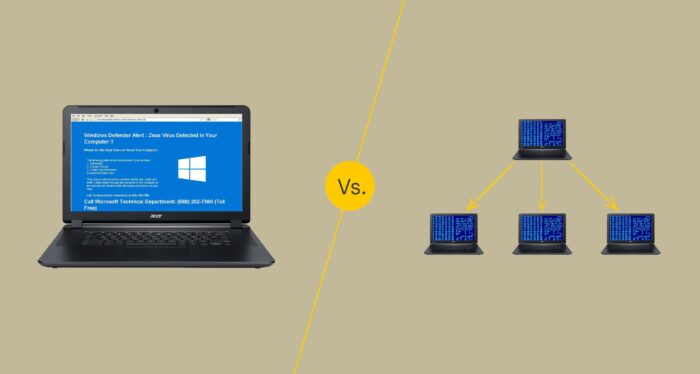
The fundamental difference between these two is that viruses need to be activated by their hosts to begin their action. In contrast, worms are autonomous programs that propagate as soon as they have broken into a system. They don’t need any invasion to implement or develop their code.
Activation
Viruses need activation because of their mode of transmission. They often come concealed in downloaded or shared (executable and non-executable) files, an application, word, or an image file. Once the carrier file is loaded into the system, the virus will stay dormant until the file has been opened. Before this has happened, the virus cannot run and cannot implement its malicious code or reproduce to continue infecting other files.
On the other side, worms don’t need any intervention to begin running. As soon as they enter your operating system through a downloaded file or network connection, they will automatically start to self-replicate. Thus, worms can spread much more rapidly than viruses across the internet and computer networks.
Since viruses and worms are types of malicious and harmful software programs, they can also carry trojan functions.
What is Trojan?
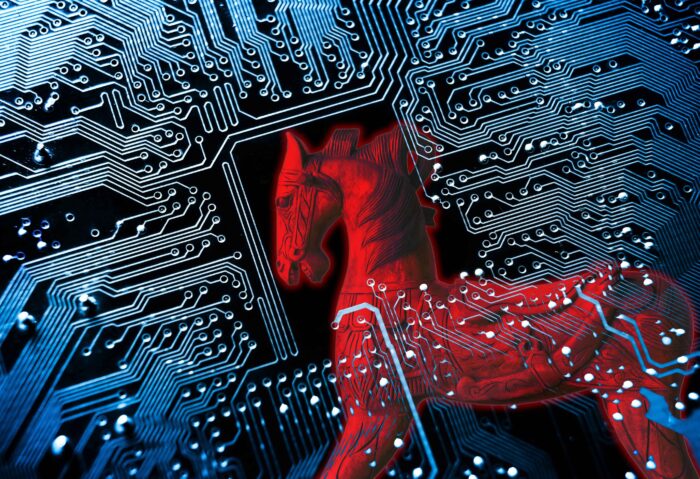
In simple terms, this is a type of malware that comes disguised as legitimate software. Trojans are prevalently used by hackers to gain access to computer systems of organizations or individuals. What they do is that they trick users through social engineering into downloading and running trojans on their devices. Cybercriminals will have backdoor access to your sensitive data and can easily spy on you when this has happened. Some of the actions they can do include;
- Copying information;
- Deleting data;
- Modifying data;
- Blocking data;
- Disrupting computer performance;
- Disrupting computer networks;
Difference between trojans, viruses and worms
One of the major differences is that trojans cannot self-replicate as computer viruses and worms do. Thus, their spread is much slower in comparison. However, when a trojan has been loaded into a device, it can cause more harm than worms and viruses.
How Trojans can impact you
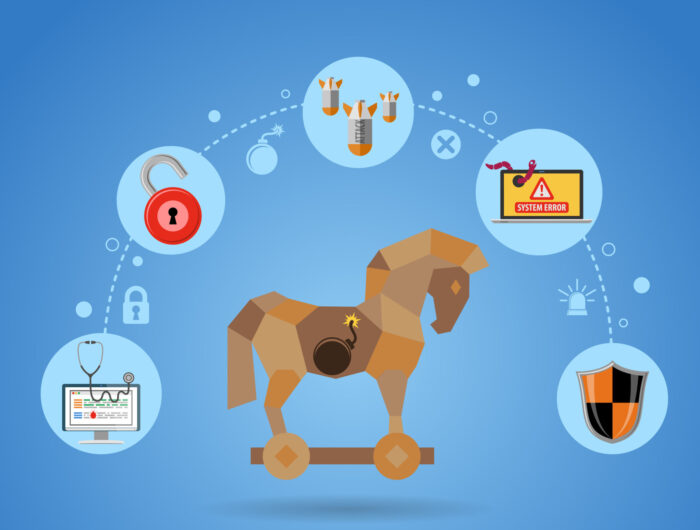
The classification of trojans depends on the type of actions they are designed to perform on your device.
Backdoor Trojan. This gives cybercriminals remote control of your computer. They will have the ability to do anything they want: sending, launching, receiving, and deleting files. And also, they will have the capacity to display some data or reboot your computer. In other cases, they will use the backdoor to create a zombie network from a group of victim computers. This will come handy in furthering their criminal activities.
Exploit Trojan. This program carries a code or data that exploits the weaknesses within an application on your computer.
Rootkit. Rootkits are meant to hide certain activities or objects on your computer. In fact, they are developed to shield malicious programs from being found. Thus, they will extend their lifespan inside your device.
Trojan-Banker.This class of trojans is solely designed to steal your online banking information. The information will include your credit/ debit card data and e-payment systems information.
Trojan-DDoS. The Trojan DDoS is a program that conducts Denial of Service (DoS) attacks at specific web addresses. What they do is, they send numerous requests using your computer and other devices to overwhelm the address that’s supposed to receive certain information. This results in a denial of service.
Other types of Trojans. The mentioned trojans are not the only ones you should worry about. There are many threats out there, such as the Trojan-Downloader, Dropper, FakeAV, GameThief, IM, Ransom, SMS, Spy, and Mailfinder. All these have the potential to destroy your computer and steal your sensitive information.
Protection against trojans, worms, and viruses
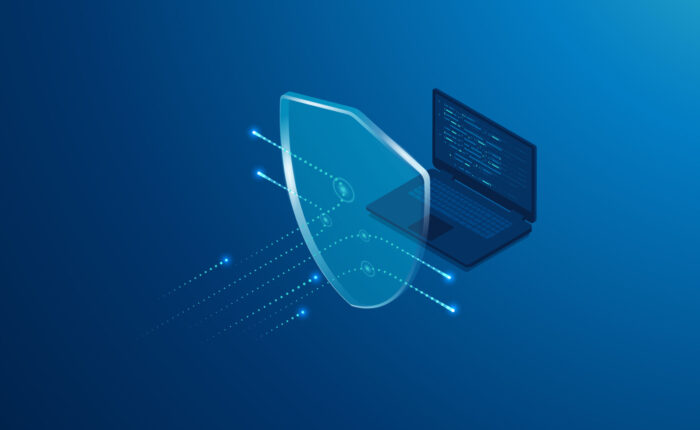
Worms, viruses, and trojans usually take advantage of the vulnerabilities in your computer security. Now, the best way to minimize attacks by these malicious programs is to keep your operating system (OS) and applications up-to-date. Additionally, you need to install effective antivirus software for enhanced protection.
Conclusion
After learning about how worms, viruses, and trojans spread and attack, you have acquired information that reveals why you need to get an effective cybersecurity solution.
In today’s world, having comprehensive computer security is mandatory. All your devices that include smartphones, desktops, tablets, and laptops, should be protected. The security solution you choose should offer real-time protection for your internet activities such as browsing, banking, communication through emails, etc.








